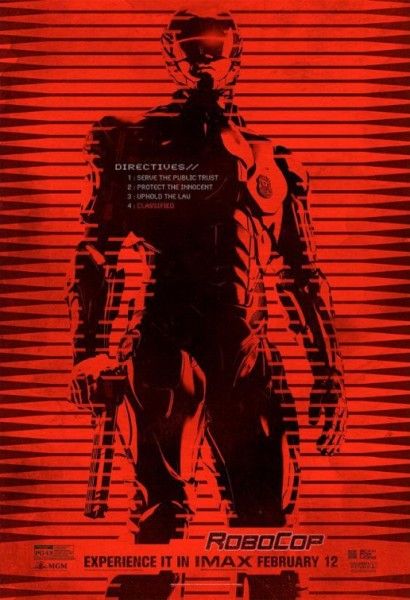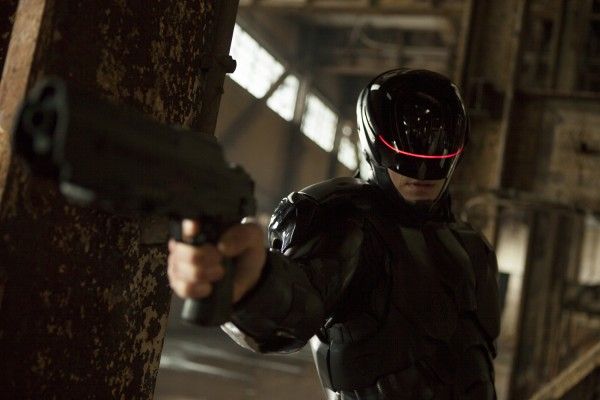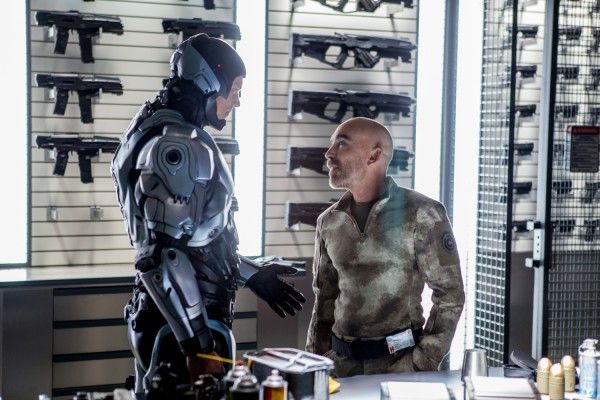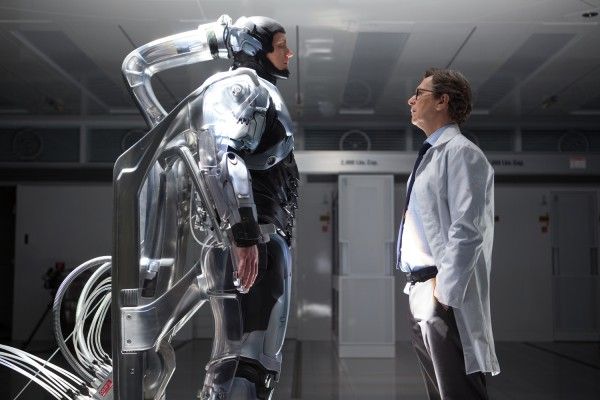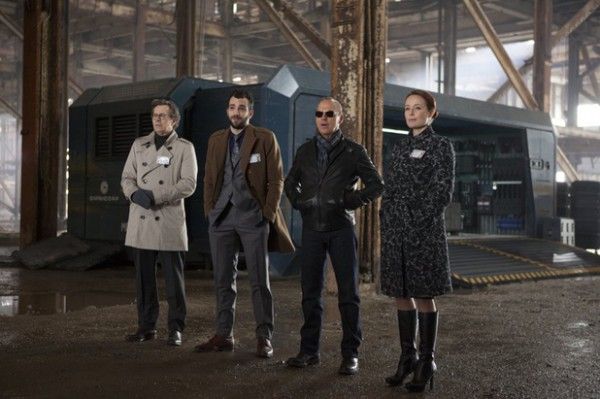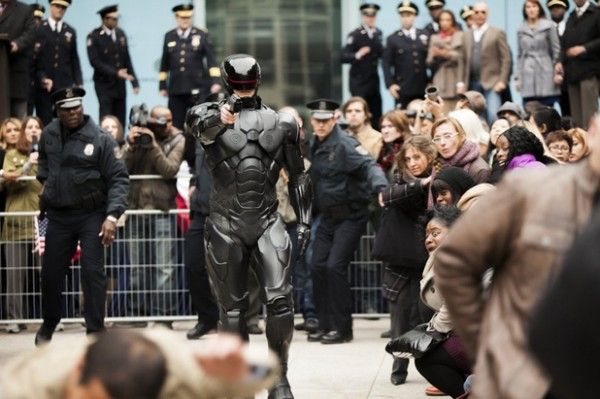From director José Padilha, this re-imagining of RoboCop is set in 2028, with OmniCorp as the world’s leader in robot technology. When loving husband, father and honest cop Alex Murphy (Joel Kinnaman) nearly dies, OmniCorp sees an opportunity to build a part-man, part-robot police officer that will not only stop crime and corruption in Detroit, but reap billions for their company. The film also stars Gary Oldman, Michael Keaton, Abbie Cornish, Jackie Earle Haley, Michael K. Williams, Jennifer Ehle, Jay Baruchel, Marianne Jean-Baptiste and Samuel L. Jackson.
At the film’s press day, filmmaker José Padilha spoke to Collider for this exclusive interview about why he wanted to re-envision RoboCop, the ideas in the original that are still relevant today, how much the final product changed from the original script, how much freedom he had to make the movie he wanted to make, the deleted scenes that will be included on the Blu-ray/DVD, why it was so important to get the film right before they did an audience preview, and how the film ended up with a PG-13 rating. He also talked about what he’s in development on next, and that he’d like to do a TV series for Netflix about the history of the DEA in Columbia, as they were trying to get Pablo Escobar. Check out what he had to say after the jump.
Collider: Why was RoboCop a movie that you felt you could put your own creative stamp on?
JOSE PADILHA: I come from a documentary background and my natural tendency, as a filmmaker, is to make a movie, if I have something to talk about. If it’s not about anything that matters, I don’t feel like doing it. I’m not against people who make movies just for fun, but I’m not one of those guys. I just want to provoke thinking and debating about certain issues. So, the way I saw the first RoboCop movie was that it was a very thought-provoking idea.
It’s the idea that there’s a connection between fascism and the automation of violence, and you can think about the connection in several ways. One way to think about it is to consider Vietnam. American pulled out of Vietnam because soldiers were dying. Now, if you replace soldiers with robots, what would have happened? It opens the door to fascism. The other way to think about it is that every army or every police force that gets people to do outrageous things, first they dehumanize the soldiers. They get them to training and turn them into machines.
That connection that [Paul] Verhoeven saw really interested me, on several levels – on political levels and on philosophical levels. I thought I could use the character to do a movie about that, and also to talk about what’s going to happen real soon, which is that everybody will have to take a position. Every country will have to develop its own legislation. The UN will have to say something about the use of drones and robots in war and law enforcement. It’s unavoidable. It’s going to happen. And that’s what attracted me to this film.
If you were going to do something that had been done before, was it important to you that it be something that you really could make your own and make your own statement with?
PADILHA: Yeah, absolutely. The filmmakers that were as bold as the ones that made the original RoboCop would be really disappointed if someone came over and just redid what they had done. The only way to be true to that is to be true to yourself and make what you believe in. And that’s what I tried to do. You’ve got the internet. RoboCop is hooked to all of the CC-TV cameras in the city, so he can see crime everywhere. Things have changed since the last film. Although the technology has changed dramatically, the issue of the connection between fascism and the automation of violence is still here. This is true of certain concepts, but not all of them. Our machines are very efficient. In the original RoboCop, the robots didn’t function correctly. In our movie, the machines work. They are very efficient. But, the issue is still there. The issue is not going to go away with efficiency. It’s a real ethical and philosophical issue that we’re going to have to deal with. To tell you the truth, I think that when the time comes for America to decide whether they’re going to allow robots to kill people and do law enforcement domestically, they’re going to say no to that and use them abroad. I can guarantee you that that’s what’s going to happen. So, it’s really a grounded film, even though it’s a sci-fi movie.
Once you had a script, were there things you had to cut or change during pre-production?
PADILHA: Yeah. A film is a living thing. The screenplay is a guideline. You really need to have a good, sound script to know that you have a dramatic structure that’s going to work thematically, and to know how one scene will got through another, and to get a sense of character. But there’s nothing that says you can’t make it better, as you’re going along. I like to keep the movie alive. I don’t like to kill the movie. Then, it becomes a mechanical thing. You’re looking for the best way of shooting it, but sometimes the best way of shooting it is changing the script. To me, it’s all about this abstract entity called the story. It’s all about the best way to tell the story, and to make a movie about the issues that this story is about. That is what creates the screenplay, and that’s what puts the camera in one place, as opposed to another, and that’s what tells me what the cast should be. Filmmaking is storytelling, for me.
Did it change a lot from the first script?
PADILHA: Yeah, totally. From the first script until the final day of shooting, we changed a lot. We changed a lot of scenes on set. We changed a lot of dialogue on set. I shot scenes that were not in the script. There was a day that I wrapped early and said, “I want to shoot another scene. Let’s go find a hospital.” I changed scenes on the spot. Michael [Keaton] and Gary [Oldman] were both there, but didn’t have a scene in the movie, so I shot a scene with them in the room together. I was given that freedom. That’s how I work in Brazil, and I don’t know how to work another way. And it was really good. This movie has a Brazilian director, a Brazilian director of photography, a Brazilian editor and a Brazilian composer. That says a lot. I was able to bring my team of creative people that worked with me on Elite Squad 1 and 2.
I had freedom on this movie, even though it was my first movie here, and that’s why this movie is different than the regular superhero movie. I like some superhero movies, but I have to say that they all feel the same to me. I’ve seen them a million times. They’re all the same movie. And this one isn’t because it’s political and it has philosophical issues in it. At least, we tried to make something different. We introduce the main character 11 minutes into the film. Who does that? The bad guy ain’t that bad. Actually, he says the life of Alex Murphy. If it wasn’t for Sellars (Michael Keaton), Alex Murphy would be dead. The bad guy has really interesting points. He says, “Machines are not corruptible. Machines don’t get tired.” He’s making strong philosophical points. Dennett Norton (Gary Oldman) believes that consciousness is nothing more than the processing of information. That’s the dominating position and philosophy today, and he’s one of the bad guys. They don’t start off being bad. They believe in what they’re doing. We do have an ironic media mogul, Fox News type of guy, but you see that on television. We have our own in Brazil. Everybody does. So, we thought we should make some fun of corporate-oriented media. We wanted to make a movie that was more about the internal logic of the story and what it means, rather than trying to create a movie with marketing elements that we can sell.
Do you have a lot of deleted scenes that you’ll include on the Blu-ray/DVD?
PADILHA: We’ve got some deleted scenes, yeah. And we’ve got some scenes that we shot, that weren’t in the script, but that are in the movie. I have no problem with showing those scenes to the audience because then it gives the audience a view into what we’ve changed. So, we’re going to do that on the DVD.
How long was your first cut? Did you have to cut the film down a lot?
PADILHA: No. I knew that I had to do well in the first preview. It’s all about the first preview. So, I told the editors working on it with me, “Let’s go for the movie, straight out. We’re going to do this. We’re going to restructure like this. I want tight sequences. We need to win this battle in the preview. This is a very different film, for this kind of movie. Rightly so, the studio is going to be like, ‘Wait a second, this is too different.’ So, we need to prove that this works for the audience.” So, we previewed the movie you saw. We only had one preview, and you basically saw the movie that we previewed. Four different little things were changed, and there was one scene that I added. That’s it. And that’s because it worked in the preview.
We were given freedom, but we also knew that it had to work, and it did. You can’t underestimate the audience. A lot of times, the audience is underestimated. People think you have to spell it out because the audience won’t get it. I think we got away with a very sophisticated movie. We have Norton explaining the illusion of free will. We managed to state sophisticated and philosophical positions in the movie, and we managed to do scenes that were different. We wanted RoboCop to transform as we were watching Frank Sinatra sing. That’s crazy, but we wanted to do it because we thought it was cool. But, we had to deliver on the preview, or we would have lost control of the movie. And when we did, it proved the point that the audience is sophisticated. The Matrix is a very sophisticated movie and it really worked, so why not do that?
Were there discussions about ratings, and having this film be PG-13 and not R?
PADILHA: It’s all about the internal logic of the movie and what it’s about. If you’re doing A Clockwork Orange, you need specific violence. If you want to do a movie like Elite Squad, in which you want to say to the audience, “Look at what the police is doing,” and you want to really drive the message, you have to be specific about it. The movie we made is very violent, but it’s not about shooting people in the head. The most violent scene in the movie for me is when you see what’s left of Alex Murphy. It’s about a guy confronting himself and wondering what makes him human. His body is gone, but he’s still here. How come? Alex Murphy finds that he’s a human being, only when he thinks about his relationship with his wife and son. That’s a very violent scene to me. I don’t do the ratings, but that doesn’t seem like it would be PG-13, even though it is. It’s violent in a philosophical way.
Where do you go from here?
PADILHA: I don’t know. I have a bunch of projects. I have a documentary that I want to make in Brazil. I have a screenplay that I’m developing in Portuguese, that I want to shoot in Brazil. I have a screenplay that I’m writing for Warner Bros. I have three or four things going on, and I don’t know which one is going to turn out to happen.
Would you consider doing a TV series?
PADILHA: Yeah, I have a Netflix series that I’m working at. It’s really interesting. It’s about the history of the DEA in Columbia, as they were trying to get Pablo Escobar. It’s actually really political. America had to create the whole enemy number one thing, at the time. It also has to do with how violent Columbia was. So, we want to make that. Television is so cool, nowadays. Television is proving that we can be sophisticated and that people will watch, if it’s good.
RoboCop is now playing in theaters.


